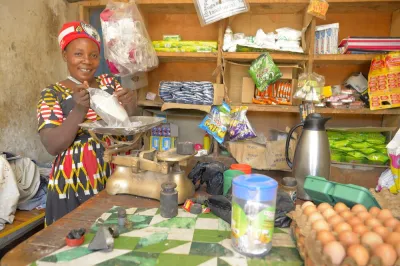Water and Wellbeing in a Changing World

Access to safe water and sanitation is foundational for communities around the world, encapsulated in Sustainable Development Goal (SDG) 6: “Clean water and sanitation for all.” Water supply and sanitation (WSS) financing can help us to meet that goal. To strengthen the case for WSS financing as a solution for SDG6, we are collecting, synthesizing and sharing our learnings and research through an exhaustive review of Water.org’s internal evidence and the sector’s available evidence.
We shared these findings at Stockholm’s World Water Week 2022, where we hosted an online session in collaboration with IWEL and Aguaconsult, titled “Water and wellbeing in a changing world.” We aimed to help unpack what we know and don’t know about the impacts of WSS financing on three areas: household finances, health and safety, and climate change. In this blog post, we share what we learned -and what we still want to learn - about each of these three areas.
Household finances
What we learned: Water.org’s local partners offer microloans for water and sanitation called WaterCredit, with an average loan size of $361. Time saved from collecting water and accessing sanitation resulted in increased annual household value by $60 for water improvements, and $96.25 for sanitation improvements. Given that WaterCredit improvements are long-term solutions - on average, they last more than 20 years - households can make up the cost of the initial investment in a few years and can continue to benefit from the increased household value.
Panelist Ann Thomas, the Senior Advisor for WASH at UNICEF, emphasized that findings like these are important for global advocacy and can “help raise the profile of solutions, creating champions and ultimately creating change.”
What we still want to learn: Questions remain about the impacts of WSS microfinance programs on household finances multiple years after the program ends, and if access to WSS financing leads to greater financial inclusion.
Health and safety
What we learned: While better health may seem like a more obvious outcome from improved WSS than safety, it turned out that safety – not health – was reported as the motivating driver for people to invest in WSS facilities. We know, of course, that unclean water and sanitation contribute to disease; however, evidence directly linking WSS improvements to long-term positive health outcomes has been mixed. On the other hand, evidence connecting WSS improvements to safety is more definitive. Water.org’s WSS loan borrowers reported higher levels of safety from animals and harassment, as well as higher levels of privacy. Improved access also led to reduced stress and increased wellbeing, leading to overall improved mental health.
What we still want to learn: While the evidence did show a clear relationship between WSS, stress and wellbeing, this area is not well understood. and highlight opportunities for cross-collaboration with other sectors.
Panelist Dr. Rick Johnston from the WHO also emphasized the need to focus more on transformative WSS - a concept that works towards a comprehensively clean environment by addressing animal and food hygiene as well. This broader focus is important because household members are exposed to pathogens through water and sanitation sources outside the household, which may have implications for the impact of household-level improvements on health.
Climate change
What we learned: Climate change impairs WSS access and service by damaging or reducing the efficacy of existing systems and making current services obsolete. 90 percent of Water.org’s surveyed financial institution partners reported that climate change is a threat to their business and communities in which they operate. They noted an increased demand for WSS improvements that hold up better to climate events such as floods or hurricanes.
Most of Water.org’s microfinance partners have made changes to their WSS loans or products to better respond to the impacts of climate change. This includes financing for improvements that better withstand climate events and guidance to households on products and services resilient to climate shocks. Our study found that improvements financed through WaterCredit programs are generally more resilient to climate change compared to loan recipients’ previous primary water supply source.
However, it's important to note that WSS services also contribute to climate change through greenhouse gas emissions. Today, WSS services account for about 1.2 percent of total global energy production. Genevieve Edens from the impact investing firm WaterEquity acknowledged that moving up the WSS ladder is part of the climate transition adjustment. As households move up the water and sanitation ladder to gain better services, they rely on improvements and technology that contribute to greenhouse gas emissions. So, there is a tradeoff between better WSS service and increased emissions that we have to be willing to make.
To help make this tradeoff less significant, investors like WaterEquity are looking to cut emissions wherever possible. They can do so by increasing efficiency, such as using technology to reduce electricity use and mitigate emissions from sanitation and wastewater treatment, and by strengthening the broader enabling environment to ensure that the sanitation solutions are properly maintained and treated.
What we still want to learn: As the impacts of climate change continue to be felt in greater frequency and intensity, especially by those living in poverty, it’s important to learn how this will affect demand and willingness for households to take out loans for improved WSS services. Furthermore, additional exploration is required to understand how to better promote more resilient WSS options to loan recipients.
Where do we go from here?
However, more can still be done to better understand and strengthen these linkages, whether through new programmatic approaches or collaborative research efforts. It’s up to us as implementers and researchers to continue to strengthen and share the collective evidence on the impacts of different WSS financing approaches.
Water.org invites other sector stakeholders to learn more by reading the full report and welcomes research partners with other implementing organizations, because we feel that access to the evidence is just as important as the evidence itself.


